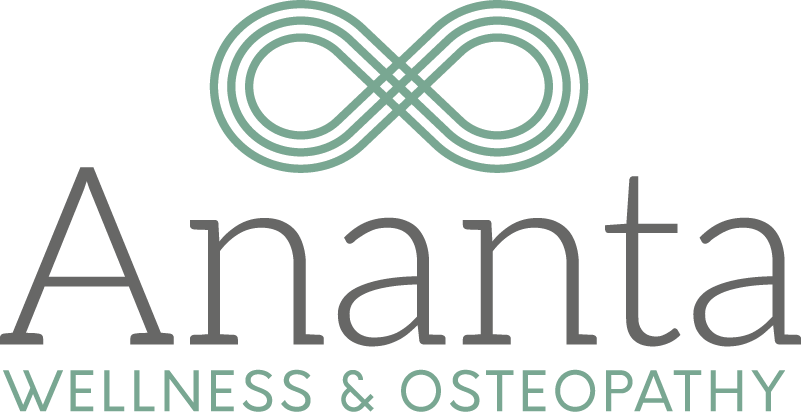As we have started to get use to our “new normal”, we may be entering the “acceptance” phase of grief for the new state of our current world dynamics. With all the new protocols to stay safe, along with the many other external and internal stressors in our lives, we may be left in a constant low stressed state. Which means you have an increase of activity in your sympathetic nervous system (SNS). This is the “flight or fight response “in our body.
During the past few months, there has been a significant decrease in many Canadians mental health reported including rises in levels worry, anxiety and depression. What does this have to do with what we do at Ananta? The mind-body connection is a powerful tool we can use to help improve your own physical and mental health, which can therefore boost the effects of the treatments you receive at Ananta Wellness & Osteopathy!
The Negative Bias
Have you ever noticed that it is much easier to have negative than positive thoughts? Or when one thing goes wrong in a day you begin to notice all the other small things that may have not gone as you planned? This is referred to as the negative bias. This theory can have an effect on your whole life…from how you feel internally, to how you react to people around you. This behavior is believed to come from the fact that our world use to be much more dangerous on a day to day basis. Although we still have threats day to day, we are getting chased by wild animals less, I hope anyways… Anthropologically, we dealt with life and death threats on a daily basis so we had to have a constant lookout for things that may be fatal. Today this is less of a concern, but our mind is still drawn to take more focus and hold on to negative thoughts.
Still don’t believe this applies to you? There has been significant research done on this topic. Scientific studies actually show that when measuring event-related potentials (ERP’s) in the brain, the response to specific negative sensory, cognitive or motor stimuli show a larger brain response than positive ones.
These negative thought patterns have an effect on your stress levels. It has been highly proven that increase stress can directly affect your physical state. As many people know, common tension areas are your shoulders and neck, although this can happen in other areas of the body. Just like we do not think about smiling when we are happy, we do think to tense muscles in our body when we feel stressed, anxious, or angry. This is an inherent pattern that forms in our body. Not only can stress be transferred into tension in our body, emotions such as sadness and anger can as well. Studies have showed when emotions such as anger and hostility are held onto, participants had higher incidents of hardened arteries even when diet was controlled for!…Crazy I know.
Types of Stress
There are different types of stress and it is not all bad. The three easy ways to categorize stress can be broken down into are chronic, acute and eustress. Chronic stress is negative stressed endured constantly and is a common cause for burnout. An example is an unhealthy relationship, or negative work environment. And yes, a pandemic is also classified as a chronic stressor. Acute stress is still bad stress but is short term and often manageable. An example could be a serious accident, or loss of a loved one. The last one is Eustress. Eustress can be acute or chronic but It is good stress. An acute eustress would be exercise, and chronic good stress would be being consistently being mentally stimulated through your work which allows you to use the creative/problem solving part of your brain.
What happens and why should we care?
All these stimuli will not only have an effect on your mental state but also your physical state if we do not have the proper tools to recognize and manage these stressors. The mind is one of the strongest tools you have in your toolkit. So, what happens if we have chronic stress? (since we are in the middle of a global pandemic) This will have a direct effect on your adrenal system and immune function. Prolonged exposure to stress can effectively “drain” the adrenal glands (organs producing hormones), which leads to a state of low cortisol. Symptoms of “adrenal fatigue” are brain fog, low energy, depressive mood and a variety of other cognitive symptoms. Increase stress levels have effect on immune response, for more details look at Anouk’s blog from August!
What can you do?
In order to create new patterns in our mind we first need to recognize the negative thoughts. An easy way to do this is either on your phone (because we carry this with us all day), or in a journal at the end of the day. First making note in your mind when the thought occurs and then actually writing it down. The act of writing it down makes that second connection, and it may surprise you how often some of the same thoughts come up! Writing it down also gives you a chance to think about how you would reshape that thought. By changing your perspective, it can ultimately change your health!
Remember how research shows that holding on to emotions such as hostility and anger can cause negative effects on your heart health? Well lucky for us the opposite, kindness, can cause so many positive benefits! There is a power of kindness, because it’s in our body chemical! Being kind to yourself and others makes you feel good because of a hormone called oxytocin. It is often referred to as a the “love hormone” but research shows these levels in our body are boosted with acts of kindness, along with increased levels of dopamine and serotonin (the happy neurotransmitter and endorphin hormone).
It has been shown to decrease blood pressure due to the vasodilation (expansion in the arteries) from the release of nitric oxide, which is released with oxytocin. Blood pressure medication is one of the most commonly prescribed medication seen, there this acts as a protector by helping naturally lower the pressure in your arteries. Oxytocin also reduced inflammation which is associated with many of the most common chronic illness such as cancer, diabetes and chronic pain.
Along with many of our jobs being mainly sedentary, as we are restricted to social gathers and as the weather turns more grey here in Vancouver, we are finding more and more of our day is spent sitting. A common contributor to dysfunction in the diaphragm is prolonged sitting. This position, especially when we do not sit with a straight spine, in turn puts pressure down on our organs placing more pressure on the diaphragm making it have to work harder. This can increase the amount of tension found in this large muscle. Already many of us take very “quick and short” breathes, a tense diaphragm will increase this tendency. The diaphragm is a big supporter of the lymphatic flow which is an important part of the immune system. It creates a large pressure differential to help move the fluid throughout your body. When this is disrupted it can cause fluid build u(p) in your legs (due to them being farther from your heart and having to work against gravity), and overall weaken the immune system.
Practicing deep breathing brings more oxygen to the blood, brain, and other tissues. When you perform short shallows breather decreases blood pH, which affects cerebrospinal fluid (CSF) and causes the body to become more acidic. Filing our lungs with to a higher capacity and slowing down the exhale induced a parasympathetic response and promote vascular and cerebral spinal fluid circulation.
How can Athletic Therapy / Osteopathy help you improve these systems?
Due to the increased SNS activity the majority of people are having today, this may be a direct goal we have as practitioners during your appointments. Along with trying to resolved your main goals, most commonly pain, we perform techniques that will try to restore homeostasis in your body through a variety of ways.
The sympathetic nervous system has a chain of ganglia (nerve cell bodies) that run both sides of the vertebrae. By releasing the myofascial or vertebral restrictions in this area it can decrease the sympathetic nervous system activity (relax). The parasympathetic nervous system nerves (as we’ve learned in previous blog posts – the parasympathetic nervous system is associated with the “rest and digest response” in our body) are located in the cranium and in the base of the skull region, as well as the sacrum. A common area for myofascial tension is the suboccipital region (base of the skull region). Tension in this area can interfere with blood flow to and from the cranium, as well as important nerves in the area. Releasing the sub-occipitals, and sacrum from the surrounding structures, as well as releasing tension in the meninges (connective tissue) at both ends of the spinal cord promote a parasympathetic response.
As mentioned above, the thoracic diaphragm is very important part in the lymphatic system, and pressure system. Another important “diaphragm” in the body is the pelvic floor, as well as a third in the cranium. These horizontal diaphragms normally rise and fall in sync, changing pressures in the body, pumping fluids, and massaging organs. The phrenic nerve innervated the thoracic diaphragm comes from the cervical vertebrae. Making sure this pathway is free of restriction and adhesions will allow the nerve to move freely. Using techniques to help all these diaphragms move in harmony, assist in allowing the body to maintain balance and helping you to take a deep breath.
It is important to conceptualize for yourself that not only does the mind affect the body but the body influences the mind. It is very easy these days to disconnect from our body and mind without exploring what relationship they have with the rest of who we are. Being aware of these connections, as well as the manual therapy we do to free up restrictive areas in your body can improve your level of cognitive embodiment. As well as improve your bodies responses to things such as stress. We are all in this together, and our team here at Ananta is here to support you through this tough time and any other challenges you may face.

